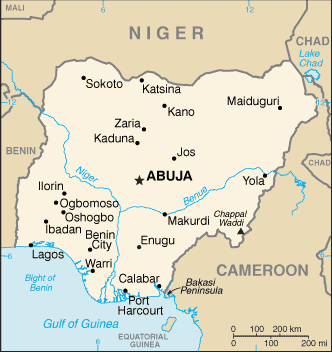Nigeria

Featured Publications & Tools
This report, sponsored by the Centers of Innovation at the US Institute of Peace (USIP), draws on the experiences of the author and Stakeholder Democracy Network (SDN) over the past four years in the Niger Delta. During this period, conflict has escalated significantly while governance indicators, for the most part, have stubbornly refused to improve.
Climate change, a growing number of voices in media and policy circles warn, is raising the risks of violent conflict in the twenty-first century. Dire futures are predicted for some of the world’s poorest, least prepared countries and their most vulnerable citizens. This report, sponsored by the Centers of Innovation at the U.S. Institute of Peace, evaluates these claims for conflict-prone Nigeria.
Latest from USIP on Nigeria
- September 26, 2012 | Publication
David R. Smock, USIP's senior vice president for the Centers of Innovation and director of Religion and Peacemaking Center, discusses the threat of Boko Haram and the threat it poses to security in Nigeria.
- September 4, 2012 | Publication
Raymond Gilpin, USIP's Center for Sustainable Economies director, discusses how a USIP project to analyze the vulnerability of energy infrastructure in fragile, resource-rich countries could inform policy-making and strengthen efforts to secure peace.
- August 3, 2012 | Publication
The maturing field of religious peacebuilding faces challenges in integrating with secular peacebuilding efforts, engaging women and youth, and working more effectively with non-Abrahamic religious traditions.
- July 24, 2012 | Publication
A key divide in Nigeria is that between citizens who are deemed indigenous and those who arrived more recently. This new report says the government must do better to hold accountable those who commit indigene-settler violence and to foster greater equality in the land, education, infrastructure, and government job savailable to both groups.
 Overview
Overview
Nigeria is an important strategic ally and trade partner of the United States, providing eight percent of U.S. oil imports. With more than 200 ethnic groups and a total population of 140 million, it is Africa’s most populous country and one that is plagued by conflict. The two most serious conflict zones are in the Middle Belt, particularly in Plateau State, and in the oil-rich Niger Delta. USIP has been active in addressing both of those conflicts.
Nigeria faced a major challenge in April 2011 when it held national and state elections. Nigeria’s previous elections have usually been fraudulent. In a significant break with the past the 2011 elections were generally free and fair. However, northern supporters of the runner-up in the presidential elections went on a violent rampage when their candidate was declared the loser. Hundreds lost their lives and many of those killed were Christians. This violence was a replay of the sectarian conflict that breaks out periodically, particularly in Plateau State.
Going Forward
 Containment of Electoral Violence
Containment of Electoral Violence
Elections in Nigeria have repeatedly featured political assassinations, voter intimidation, intra- and interparty clashes, and communal unrest. The 2011 elections could hopefully mark a turning point in the consolidation of Nigeria’s democracy, but they also provoked worsening ethnosectarian clashes.- Read “Breaking the Cycle of Electoral Violence In Nigeria”
December 2010 | Special Report by Ebere Onwudiwe and Chloe Berwind-Dart
- Read “Breaking the Cycle of Electoral Violence In Nigeria”
 Ameliorating Christian/Muslim Conflict in the Middle Belt
Ameliorating Christian/Muslim Conflict in the Middle Belt
Working with Imam Mohammed Ashafa and Pastor James Wuye of the Inter Faith Mediation Centre, USIP has sponsored and participated in multiple mediation efforts in the Middle Belt. | Learn more about USIP's work on Christian/Muslim relations in Nigeria
- Resettlement and Reintegration of Ex-Combatants in the Niger Delta
 USIP has conducted several trainings in conflict analysis and conflict management for community groups in the Niger Delta to enhance their peacemaking skills. Much of this has been in partnership with the African Centre for Corporate Responsibility (ACCR). In addition, USIP has given grants for the training of traditional leaders to make them more effective peacemakers. | Learn more about USIP's work in the Niger Delta
USIP has conducted several trainings in conflict analysis and conflict management for community groups in the Niger Delta to enhance their peacemaking skills. Much of this has been in partnership with the African Centre for Corporate Responsibility (ACCR). In addition, USIP has given grants for the training of traditional leaders to make them more effective peacemakers. | Learn more about USIP's work in the Niger Delta
- Read "Something or Nothing: Granting Niger Deltans a “stake” in oil to reduce conflict"
October 2010 | Policy Paper by Aaron Sayne, Transnational Crisis Project
- Read "Something or Nothing: Granting Niger Deltans a “stake” in oil to reduce conflict"
Multimedia
- Watch a documentary about the Imam and the Pastor's work in Nigeria
- Listen to the recent event "Is Nigeria a Hotbed of Islamic Extremism"
- Listen to USIP Senior Research Associate Dorina Bekoe on strategies for enhancing growth, governance and security in Nigeria
Get Involved with USIP
- See upcoming public events at USIP
- Visit the USIP Newsroom
- Receive latest USIP news and analysis in your email
- Take a class at the Academy

